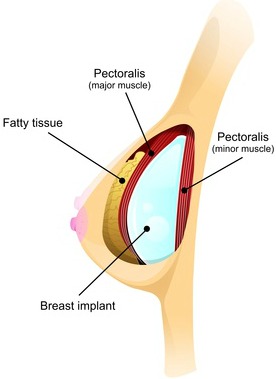Breastfeeding with Breast Implants and More...
Any breast surgery (breast implants, breast reduction, breast augmentation, nipple surgery) is a surgery and puts successful breastfeeding at risk.

Even breast biopsy can be a risky procedure when it comes to breastfeeding. However, they don’t rule out breastfeeding.
So you should still give it a try. Even a drop of breast milk is of the highest value to your baby.
Post-surgical breastfeeding success depends on a number of factors:
- Milk ducts and nerves damage
Milk ducts are there to carry milk to the nipple for your baby to suck. If milk ducts are damaged, milk flow is obstructed.
Nerves ensure normal hormonal function during breastfeeding. Changes in nipple sensitivity are signs of nerve supply damage. These two may lead to low milk supply.
- Place of incision
Milk duct damage depends on the place of incision. Incisions made away from the areola are less likely to disrupt milk supply. Incisions on the areola are more risky.
- Type of surgery
Breast augmentation (enlargement) surgery
is less likely to cause damage to the ducts or the nerve supply. Most breast
augmentation surgeries are performed without re-attachment of the nipple and
the areola. Since these two are left intact, there is less effect on breastfeeding.
If a silicone implant is placed, there is a risk that it may leak. It is still advised that women with breast implants try breastfeeding, as there is no harm for the baby.
Breast reduction surgery has bigger effect on breastfeeding. This surgery involves breast tissue removal, and repositioning of the nipples and the areola. There is more risk of milk duct damage. Breast reduction surgery may also damage nerve supply.
- Time after surgery
The longer it is since the surgery, the better the chances of successful breastfeeding. Milk ducts and nerves can recover and “regrow” after the surgery.
Sometimes breast augmentation and breast reduction surgeries are performed to correct irregular breast shape (elongated breasts) or large breast size. These conditions are emotionally and physically challenging for the woman.
These types of breasts may not produce enough milk. In these cases, surgery gives the woman a chance to feel better about herself and to breastfeed effectively.
Help Yourself
- If your milk supply is low after the breast surgery, try these methods of increasing milk production. Consult your doctor before using any of these methods. Be gentle and consider your individual situation.
- Women with breast implants should do baby weight checks daily to make sure they have enough milk.
- Test your milk supply. You will find 2 tests here. Let your baby’s doctor know about your breast implants. The doctor may want to see your baby more often.
- If you need to undergo a surgery while breastfeeding, consider weaning from just one breast that needs the surgery. Look for a surgeon who has experience in performing surgeries without lactation disruption.
- If you need to wean from one breast or if it stops producing milk, pump the other breast after each feeding to promote better milk production.
- If your pump has a strength regulator, start at the lowest position, especially if you have breast implants. Maximum strength is still not stronger than the baby sucking, but you want to be careful not to cause any implant damage. So start slow.
- Surgery may cause stronger breast engorgement due to blocked milk ducts or breast tissue changes.
- Have a lactation consultant available and ask for help.
Cancer Concern
Many doctors indicate that breastfeeding decreases woman’s risk of breast cancer. Read about other breastfeeding benefits.
A surgery to remove cancer doesn’t put breastfeeding at a larger risk than any other breast surgery. Radiation and chemotherapy, however, affect breastfeeding.
If the woman is not getting any radiation or chemotherapy at the moment, it is safe to breastfeed. These treatments may, however, drastically reduce milk supply.
If only one breast was operated on, milk supply from the healthy breast can be sufficient to exclusively breastfeed.
Your baby may refuse to nurse on the radiation-treated side due to milk taste or composition change.
However, refusal of one breast is not a sign of an illness. There are other reasons why the baby may refuse one breast. Click here to read more.
Any information about cancer spreading to the breastfed baby or about higher chance of cancer re-occurrences in breastfeeding women is not known for a fact. There is no research to prove it.
Breastfeeding after breast surgery, including breast implants, is more challenging, but absolutely possible. Keep up the excellent breastfeeding job and be proud of yourself!
There are many ways to show your love and devotion to your kids and to win their trust. Breastfeeding is the most natural one.
Yours,
Viktoriya
Home › Breastfeeding Problems › Breast Implants










